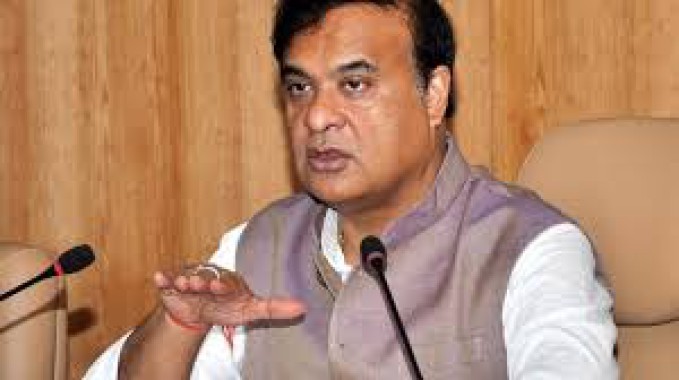




















Friday, Apr 04, 2025 19:15 [IST]
Last Update: Friday, Apr 04, 2025 02:20 [IST]
Guwahati, (IANS): At least five persons were pushed back to Bangladesh by Assam
Police on the charges of illegal infiltration, said Chief Minister Himanta
Biswa Sarma on Thursday.
These
five Bangladeshi nationals entered Indian territory by crossing the border
unlawfully in the Sribhumi district of Assam. They were first arrested by
security personnel and later pushed back to the neighbouring nation.
Taking
to X, Chief Minister Sarma wrote, “5 Illegal Infiltrators Apprehended and
Deported. In a strong and decisive move against illegal infiltration,
@sribhumipolice apprehended 5 Bangladeshi nationals and pushed them back across
the border.”
Five
Bangladeshi nationals were identified as Md. Iman Miya, Md. Naim Ahmed,
Miyazaki Muhammad Rasel, Abdul Kalam Miya and Md. Munna.
Earlier,
the Chief Minister said: “We have put the security forces on high alert at the
international border following the unrest in Bangladesh to check infiltration.
The police have detected a good number of illegal immigrants on a daily basis
along the international border; however, no Hindu infiltrator from Bangladesh
was arrested in the last five months.”
The
Chief Minister argued that the Hindu community people have immigrated from
Bangladesh 30 or 40 years ago, and the rest of the people have been living in
the neighbouring country for different reasons.
“Most
of the Hindu community people who had the desire to cross the border and come
to India had come here 30 or 40 years ago. The rest of the minority people have
been living in Bangladesh despite facing large-scale atrocities in the
neighbouring country. I guess they have their own reasons for staying there -
maybe a love for the soil or patriotism towards Bangladesh,” he said.
Sarma
also stated that the Bangladeshi infiltration spiked up in the last few months
due to the collapse of the textile industry in the neighbouring country,
leaving many jobless there.
He
stated that the economy of Bangladesh has collapsed due to unrest, and the
majority of the community people were more affected than the minority section.
“So
far, we have arrested around 1000 Bangladeshi people in the last few months.
They were pushed back immediately after their arrest,” the CM mentioned.
He also attributed the illegal infiltration to incentives offered by a few textile industry owners in India.
Supreme
Court refuses to relax crackers-ban in Delhi-NCR
New
Delhi, April 3 (IANS) The Supreme Court on Thursday refused to relax its order
imposing a complete ban on firecrackers in Delhi and National Capital Region
(NCR).
Noting
that air pollution levels had remained alarming for a considerable time, a
bench of Justices Abhay S Oka and Ujjal Bhuyan opined that imposing
crackers-ban only for a period of 3-4 months every year is not effective and no
exception, even for green crackers, should be allowed.
It said that unless it was shown that the pollution caused by the green crackers was bare minimum, there was no question of giving them a relaxation.
The
Justice Oka-led Bench remarked that the right to health, an essential part of
the right to life guaranteed under Article 21 of the Constitution of India,
includes the right to live in a pollution-free atmosphere.
In
January this year, the top court had extended the effect of the orders passed
by the Uttar Pradesh and Haryana governments imposing a complete ban on
firecrackers in the areas falling under the NCR region.
It
had ordered that the ban imposed by the states of Uttar Pradesh and Haryana,
which was effective till January 17, be extended till further orders.
On
the intervention application filed by the Federation of Fireworks Traders, the
Justice Oka-led Bench said: "Why should we hear you? You will have to
satisfy us that burning firecrackers do not create pollution. You can sell
firecrackers in other parts of India where there is no ban.”
Earlier,
the Supreme Court had said that the ban already imposed by the Delhi and
Rajasthan governments would turn effective only when the remaining states
impose similar measures.
The
apex court was hearing a public interest litigation (PIL) relating to the
control of pollution in Delhi and NCR.
In
the course of the hearing, it was told that while Haryana had permitted the use
of green crackers, Rajasthan had imposed a complete ban on firecrackers in the
NCR region.
The
Supreme Court had asked the Uttar Pradesh and Haryana governments to impose a
ban on firecrackers in the same terms as imposed in Delhi.
Before
this, the top court had asked the state governments of Delhi and adjoining
states to take a call on a permanent ban on the use of firecrackers.
Asking
the state governments to place their stand on record, it had indicated issuing
necessary guidelines, including on the manufacture, storage, sale and
distribution of firecrackers.
"The
ban on firecrackers will be helpful not only to curb the air pollution but the
noise pollution as well. We will consider issuing necessary directions to the
state governments on the issue of a ban on the use of firecrackers," it
had said.
In
November 2024, after Diwali, the Supreme Court had remarked that the ban on
firecrackers was hardly implemented in the national capital and pulled up the
Delhi government for not implementing it. It had called for an affidavit from
the Delhi government and Police Commissioner detailing the steps taken to
enforce the ban.
The
apex court had suggested that the premises of sellers of firecrackers should be
sealed, apart from enforcing a ban on importing firecrackers from neighbouring
states.
